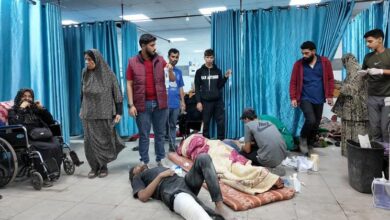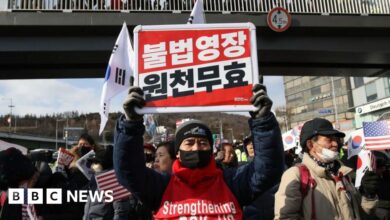The struggle to reunite children with their families in war-torn Gaza
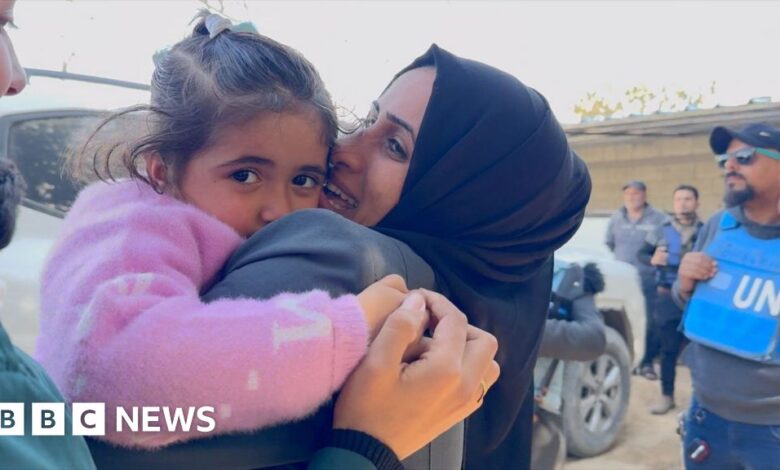
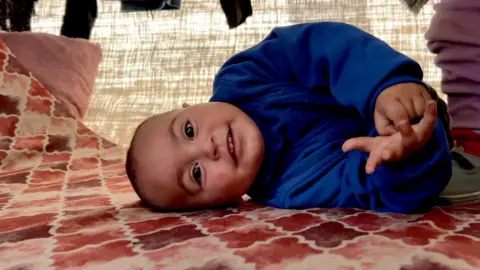 BBC
BBCThey are smiling now as they play together in the sand at the al-Mawasi tent camp in southern Gaza, but the Masri family’s children have survived the horrific events.
“Their lives are in danger, they have suffered so much killing and destruction,” said their grandmother, Kawther al-Masri.
An Israeli bombing six weeks ago struck their home in the northern town of Beit Lahia, killing one-year-old Jamal’s parents, his cousins Maria, Jana and Zeina’s mother and two younger sisters. from two to nine years old. The girls’ father was captured by Israeli forces more than a year ago.
When the children were pulled from the rubble, they were injured and alone.
Since the war began in Gaza, more than 14,500 children have died, thousands have been injured, and an estimated 17,000 have been abandoned or separated from family members who provide regular care. they.
Some are too young to know their names and remain unidentified.
In the chaos caused by bombings and mass displacement, the United Nations children’s agency, Unicef, managed to reunite just 63 children with their parents or guardians. Last month, the BBC followed the story of the four Masri cousins.
“The happiness of their return was indescribable, but it was overshadowed by sadness – they returned without their parents,” Kawther al-Masri told us.
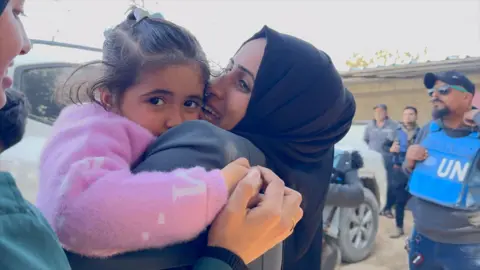
The news that initially reached Kawther in mid-November was that all of her loved ones still in the family home in northern Gaza had been killed. But she said that after praying, she was told that her three grandchildren were still alive.
She immediately knew that she had to bring them to her. “I long for them,” she explains. “Honestly, I wish I could go to the North and get them back, but God’s will comes first.”
For more than a year now, Israel has divided the northern third of the Gaza Strip from the southern two-thirds along the Wadi Gaza valley. Humanitarian workers must exercise special coordination to cross the Israeli military zone that divides the territory.
After Kawther gathered the documents she needed, Unicef conducted its own welfare checks and went through a laborious process of arranging the transfer of the Masri children.
When the four bereaved cousins received medical treatment, distant relatives took care of them. Unicef filmed their emotional goodbye before taking the children away in an armored vehicle.
The short distance from Gaza City to Deir al-Balah where the convoy is headed requires passing Israeli checkpoints, takes a long time to drive and can be very risky should war break out. However, Unicef said it was prioritizing child reunification.
“There are many challenges,” said Rosalia Bollen, a spokeswoman for Unicef. “But we are talking here about very vulnerable children.”
“These are stories about loss – about profound emotional and physical trauma and for these children to be able to recover. That they are reunited with one or both parents, or a member of their Family is extremely important.”
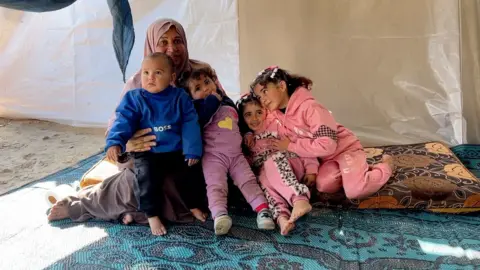
Kawther describes the agonizing wait on the day the children arrived until Unicef called. She hasn’t seen her grandchildren in 14 months.
“I don’t know who to hug first!” she exclaimed. “The first person I hugged was Jana and then Zeina. I kissed and hugged her.”
“My son’s children used to call me ‘Kuko’ and although Zeina couldn’t tell the last time I saw her, she knew this was my nickname. She kept asking: ‘Are you “Are you Kuko? Are you the one I came here for?” And I told her I felt safe.”
The story of the Masri family is not uncommon. They were separated in the early days of the war.
A week after the October 7, 2023, Hamas attack that killed about 1,200 people in southern Israel, the Israeli military ordered 1.1 million people in northern Gaza to move south, signaling that they plans to initiate a ground invasion.
Kawther and most of her children quickly packed up and moved to Rafah, but transportation for her two sons, Ramadan and Hamza, was unsuccessful. In the end, they stayed behind with their wives – one of whom was pregnant – and their young children.
In November 2023, Hamza was captured by Israeli forces in Beit Lahia. His relatives affirmed that he and they were both farmers and had no political affiliation. The BBC was unable to obtain information from Israeli authorities about what happened to Hamza.
Israel has arrested thousands of Gazans during the war on suspicion of terrorism.
“This is our fate,” Kawthar told us desperately. “We lost our homes, lands and loved ones, and we were divided between the North and the South.”
With so many people missing, many turned to the International Committee of the Red Cross (ICRC) for help. It takes detailed information and cross-checks it with sources it can access, such as hospital lists and names of returned detainees.
More than 8,300 cases have been reported to the organization but only about 2,100 have been processed. Of these, only a few have resulted in family reunification.
Sarah Davies from the ICRC said: “People are in limbo – they don’t know whether their family member is alive, whether they are injured or in hospital, whether they are trapped under the rubble or whether they will see them again.”
Doctors and staff at the hospital also help try to connect patients with relatives.
Nearly a year ago, the BBC filmed a newborn baby born by cesarean section after his mother was killed in an Israeli airstrike. Doctors called the girl “Hanna Abu Amsha’s daughter” and kept information about her in the hope that relatives could track her down.
Recently, the nursery at Al-Aqsa Martyrs Hospital in Deir al-Balah told us that the baby had finally been handed over to his father and was in good health.
A few days after the Masri family reunion, a local journalist working with the BBC visited Kawther and her grandchildren in the al-Mawasi displaced persons camp, where they are now living in a tent. With scarce aid, Unicef has helped them get more food and medicine.
The girls also had warm coats – some protection against the frigid temperatures that have caused several infants to die of hypothermia, including at the camp on the coast, near the city of Khan Younis.
Although Kawther felt relieved to have her children with her, she still did not feel they were safe. She worries about how to care for them and their mental health.
“They are in shock,” she said. “No matter how much we tried to distract the girls and avoid talking about the war, sometimes they still wandered off in their thoughts.”
“When night fell, they were afraid. They said: ‘There are planes, there are attacks.’ They asked me: ‘Is it morning yet?’ and only when it is light do they feel secure.”
Kawther said she is hopeful for a ceasefire and for her grandchildren to rebuild their lives. Don’t become part of a lost generation.




